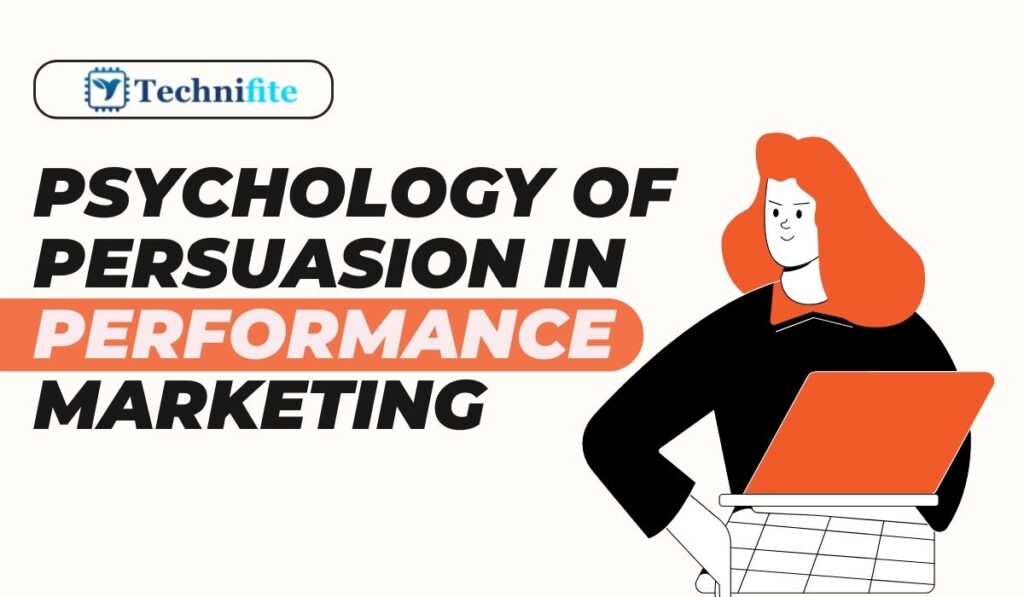Psychology of Persuasion in Performance Marketing: In the fast-paced world of digital marketing, businesses are constantly vying for consumers’ attention. With the advent of performance marketing, the focus has shifted from mere exposure to driving specific actions – clicks, conversions, and sales. In this landscape, understanding the psychology of persuasion is paramount. By delving into behavioural science principles, performance marketers can create strategies that attract, engage, and convert audiences effectively. This blog explores the intricate relationship between psychology and performance marketing, highlighting how behavioural science can elevate marketing efforts to new heights.
Understanding the Basics: What is Performance Marketing?
Before we delve into the depths of psychology, we must grasp the fundamentals of performance marketing. Unlike traditional marketing, performance marketing is highly measurable and relies on data-driven strategies. Advertisers pay only when specific actions are taken, such as clicks, sign-ups, or sales. This precision in measurement has made performance marketing a go-to choice for businesses aiming to optimize their marketing budgets and maximize ROI.
The Psychology of Persuasion: A Brief Overview
At its core, persuasion is about understanding human behaviour and decision-making processes. Renowned psychologist Robert Cialdini identified six principles of persuasion: reciprocity, commitment, social proof, authority, liking, and scarcity. These principles serve as a roadmap for marketers to influence consumer behaviour and drive conversions.
- Reciprocity: People tend to reciprocate favours, gifts, or kind gestures. In the digital realm, offering valuable content, free trials, or exclusive discounts creates a sense of obligation, nudging customers to engage further.
- Commitment: Once someone commits to a small action, like signing up for a newsletter, they are more likely to follow through with larger requests. Marketers can employ this principle by designing campaigns encouraging small initial commitments, gradually leading to bigger conversions.
- Social Proof: Humans are social beings, often relying on the actions and opinions of others to guide their own decisions. Testimonials, reviews, and user-generated content are powerful social proof, building trust and credibility.
- Authority: People are more likely to follow the advice or suggestions of perceived experts. Establishing authority through thought leadership content, certifications, or endorsements can significantly impact consumer trust and influence their choices.
- Liking: People are more easily persuaded by those they like. Building a brand image, using relatable language, and connecting with the audience personally can enhance likability and persuasion.
- Scarcity: The fear of missing out (FOMO) drives human behaviour. Limited-time offers, exclusive deals and product scarcity create a sense of urgency, compelling consumers to act swiftly.
Applying Behavioral Science to Performance Marketing
Now that we have a foundational understanding of the principles of persuasion, let’s explore how performance marketers can apply behavioural science to their campaigns:
- Personalized Messaging: Utilize data analytics to understand customer behaviour and preferences. Tailor marketing messages to individual preferences, increasing the chances of resonating with the audience on a personal level.
- Emotional Appeal: Emotions play a significant role in decision-making. Craft compelling narratives that evoke emotions like joy, fear, or nostalgia. Emotional resonance fosters a deeper connection with the audience, encouraging them to take desired actions.
- Cognitive Biases and Decision Making: Familiarize yourself with common cognitive biases such as anchoring, availability heuristic, and confirmation bias. By understanding these biases, marketers can frame offers and information that align with consumers’ natural thought processes, increasing the likelihood of conversion.
- Behavioral Retargeting: Implement retargeting strategies based on user behaviour. By understanding what products or services users have shown interest in, marketers can deliver targeted ads, reminding them of their initial interest and encouraging them to complete the purchase.
- Gamification: Integrate elements of gamification into marketing campaigns. Games and challenges trigger the brain’s reward centres, encouraging active engagement. Interactive content, quizzes, and reward-based systems can enhance user participation and drive conversions.
- Neuro-Marketing and Visual Cues: Leverage neuro-marketing techniques by incorporating specific colours, images, and visual cues that resonate with the audience’s subconscious mind. Certain colours and images can evoke specific emotions and influence purchasing decisions.
Conclusion
In the ever-evolving landscape of performance marketing, understanding the psychology of persuasion is a game-changer. By harnessing behavioural science principles, marketers can create campaigns that capture attention and drive meaningful actions from consumers. Personalization, emotional resonance, cognitive understanding, and innovative approaches like gamification are the keys to unlocking the full potential of performance marketing.
As businesses navigate the digital realm, integrating these psychological principles into their strategies will be the cornerstone of successful performance marketing campaigns. By aligning marketing efforts with the intricacies of human behaviour, businesses can create authentic connections with their audience, foster brand loyalty, and achieve unparalleled success in the competitive world of digital marketing.
Frequently Asked Questions (FAQs)
What is Performance Marketing, and How Does it Differ from Traditional Marketing?
Performance marketing is a comprehensive term that refers to online marketing and advertising programs in which advertisers (brands or businesses) pay marketing companies (or affiliates) when a specific action is completed, such as a sale, lead, or click. Unlike traditional marketing focusing on brand exposure, performance marketing is highly measurable and results-driven. Advertisers only pay for actual, measurable results, making it a cost-effective and efficient marketing approach.
How Can Behavioral Science Enhance Performance Marketing Strategies?
Behavioural science provides valuable insights into human decision-making processes and behaviours. Marketers can create more persuasive and engaging campaigns by understanding psychological principles such as reciprocity, social proof, and emotional triggers. Incorporating these insights allows marketers to personalize messages, evoke emotions, and appeal to cognitive biases, increasing conversions and customer engagement.
What Role Does Data Analytics Play in Performance Marketing?
Data analytics is crucial in performance marketing, enabling marketers to collect, analyze, and interpret large data sets to gain insights into consumer behaviour. Marketers can optimise their campaigns by understanding customer preferences, browsing patterns, and purchasing history. Data analytics also helps in A/B testing, retargeting strategies, and identifying key performance indicators (KPIs), allowing marketers to make data-driven decisions and enhance the effectiveness of their marketing efforts.
How Can Businesses Implement Personalization in Performance Marketing Campaigns?
Personalization in performance marketing involves tailoring marketing messages and offers to individual consumers based on their preferences, behaviours, and demographics. Businesses can implement personalization by utilizing customer data, segmenting their audience, and creating targeted campaigns for each segment. Personalized email marketing, product recommendations, and dynamic website content are common ways to implement personalization. Businesses can significantly improve customer engagement and increase conversions by delivering relevant and customised content.
What Is Gamification and How Can It Be Integrated into Performance Marketing?
Gamification uses game design elements and principles in non-game contexts, such as marketing campaigns. In performance marketing, gamification incorporates elements like challenges, rewards, badges and points systems into marketing strategies. It engages customers by making the marketing experience interactive and enjoyable. Businesses can integrate gamification through interactive quizzes, contests, loyalty programs, and mobile apps. By adding an element of fun and competition, gamification enhances user engagement, encourages participation, and can lead to higher conversion rates.


